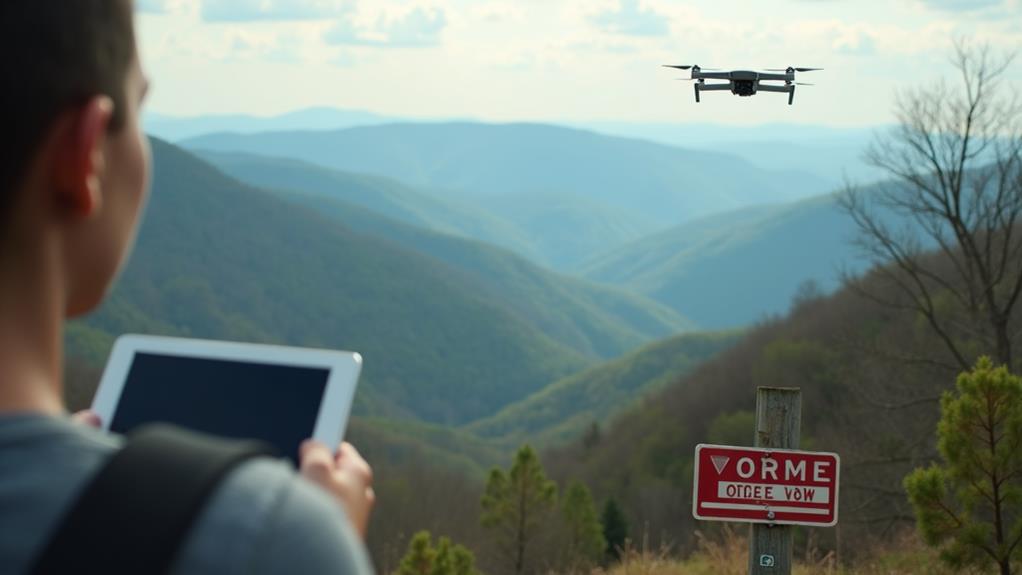
If you're planning to take your drone out for a spin in West Virginia, it's vital you're aware of the state's regulations. You might assume it's just a matter of grabbing your device and taking off, but that's not the case. From registration requirements to no-fly zones, there are several key laws you need to know to avoid fines or even having your drone confiscated. Understanding West Virginia's drone laws can help you stay safe and on the right side of the law – but where do you start?
Contents
Key Takeaways
- In West Virginia, drones weighing 0.55-55 pounds must be registered with the FAA for recreational or commercial use.
- Recreational drone flights in West Virginia are restricted within 5 miles of airports, national parks, and wildlife refuges.
- Visual line of sight must be maintained during drone flights in West Virginia, with a maximum altitude of 400 feet above ground level.
- Commercial drone operations in West Virginia require a pilot certification with a small unmanned aircraft systems (sUAS) rating from the FAA.
- Drone flights in West Virginia may be restricted due to Temporary Flight Restrictions (TFRs) or other airspace restrictions, which can be checked with the FAA.
Registration Requirements in West Virginia
Registering your drone in West Virginia is a straightforward process, provided you comply with the federal regulations set by the Federal Aviation Administration (FAA) and any applicable state requirements.
You'll need to register your drone if it weighs between 0.55 and 55 pounds and is used for recreational or commercial purposes. You can register your drone on the FAA's UAS registration website, where you'll be required to provide your name, email address, and physical address.
As a drone owner in West Virginia, it's also essential to weigh drone insurance options to protect yourself against liability.
Liability coverage plans can provide financial protection in case of accidents or damage to property. These plans typically cover damages to third-party property or injuries to people. When selecting a liability coverage plan, you should weigh the type of drone you own, the frequency of use, and the level of coverage you need.
Recreational Drone Flight Restrictions
Having registered your drone and obtained the necessary insurance coverage, you're now ready to take to the skies in West Virginia. However, it's vital to understand recreational drone flight restrictions to avoid any potential penalties or hazards. Familiarize yourself with the state's airspace rules, ensuring you're aware of restricted areas, such as National parks and wildlife refuges.
Recreational Drone Flight Restrictions in West Virginia
| Restriction | Description |
|---|---|
| National Parks | Prohibited, except for designated areas with special permits |
| Wildlife Refuges | Prohibited, except for designated areas with special permits |
| Airports | Prohibited within 5 miles of airport boundaries, unless authorized |
| No-Fly Zones | Prohibited over military bases, national security areas, and disaster zones |
| Altitude Limit | Maximum altitude of 400 feet above ground level |
When flying your drone recreationally, always maintain a visual line of sight, yield to manned aircraft, and never fly near emergency response situations. Keep in mind that these restrictions are subject to change, so it's imperative to check with the Federal Aviation Administration (FAA) for the most up-to-date information on recreational drone flight restrictions in West Virginia.
Aerial Photography Permitting Process
To capture stunning aerial footage or photos in West Virginia, you'll need to navigate the state's permitting process for aerial photography.
The process involves obtaining the necessary permits and authorizations from the relevant authorities. If you plan to use your drone for commercial purposes or to capture aerial footage in restricted areas, you may need to obtain an aerial waiver from the Federal Aviation Administration (FAA).
Additionally, you may need to pay photography fees, which vary depending on the location and type of shoot.
- Determine the type of permit required: Check if you need a permit for commercial or recreational use, or if you need to obtain an aerial waiver.
- Submit a permit application: Provide detailed information about your project, including the location, date, and type of equipment to be used.
- Pay the required fees: Pay the photography fees, which vary depending on the location and type of shoot.
- Obtain liability insurance: Consider obtaining liability insurance to cover any potential risks or damages.
No Fly Zones in West Virginia
Once you've secured the necessary permits for aerial photography in West Virginia, it's vital to familiarize yourself with the state's no fly zones to avoid violating federal regulations and guarantee safe operations.
You'll need to understand the various types of airspace restrictions that apply to drones in West Virginia. The state has several no fly zones, including National Parks, where drone operations are strictly prohibited.
These areas are designated to protect both the environment and visitors. You'll also need to be aware of Temporary Flight Restrictions (TFRs) and other airspace restrictions that may be in place due to events, emergencies, or military operations.
Additionally, some areas around airports, national security sites, and other sensitive locations are also restricted.
You can use online tools, such as the Federal Aviation Administration's (FAA) B4UFLY app, to determine if a specific location is within a no fly zone.
It's imperative to check these resources before each flight to verify compliance with federal regulations and safe operations. By understanding West Virginia's no fly zones, you can avoid fines, penalties, and other consequences associated with violating airspace restrictions.
Commercial Drone Operation Regulations
Commercial drone operations in West Virginia require compliance with a distinct set of regulations, which are designed to guarantee safe and responsible use of unmanned aircraft systems (UAS) for business purposes.
As a commercial drone operator in West Virginia, you must understand and adhere to these regulations to avoid penalties and fines.
To confirm compliance, you should consider the following requirements:
- Pilot Certification: You must hold a valid remote pilot certificate with a small unmanned aircraft systems (sUAS) rating from the Federal Aviation Administration (FAA).
- Drone Registration: Your drone must be registered with the FAA if it weighs between 0.55 and 55 pounds.
- Drone Insurance: You may be required to have drone insurance to cover damages or injuries caused by your drone.
- Operational Limitations: You must comply with operational limitations, such as flying below 400 feet, maintaining visual line of sight, and avoiding restricted airspace.
Frequently Asked Questions
Can I Fly Drones Over Private Property in West Virginia?
When flying drones over private property in West Virginia, you must consider boundary disputes and airspace rights. You may fly over private property, but must respect landowners' rights and not disrupt their activities or invade their airspace.
Are Drone Racing Events Allowed in West Virginia?
Are you aware of the regulations surrounding drone racing events? In West Virginia, you'll need to secure racing permits and comply with drone regulations, which may involve registering your drone and obtaining special permits.
Can I Use Drones for Hunting in West Virginia?
You can use drones for wildlife observation, but not to aid hunting in West Virginia. Drones can't be used to locate or track game, nor can they be flown over hunting blinds or wildlife habitats for hunting purposes.
Do I Need Insurance to Operate a Drone in West Virginia?
As you prepare to take to the skies like Icarus, you'll want to guarantee you're protected in case of a crash. In West Virginia, you're not required to have insurance, but Drone liability can be costly, so consider it to avoid hefty premiums.
Are Drones Permitted in West Virginia State Parks?
You should check Park Rules before flying drones in West Virginia state parks, as regulations vary, and guarantee operations prioritize Visitor Safety to avoid disrupting the natural environment and other park-goers.
Conclusion
As you prepare to take to the West Virginia skies with your drone, remember that knowledge is power – and in this case, it's also the law. Don't risk a crash course in regulations; instead, familiarize yourself with the state's drone laws to avoid a world of trouble. From registration requirements to no-fly zones, being informed is key to a safe and successful flight.






